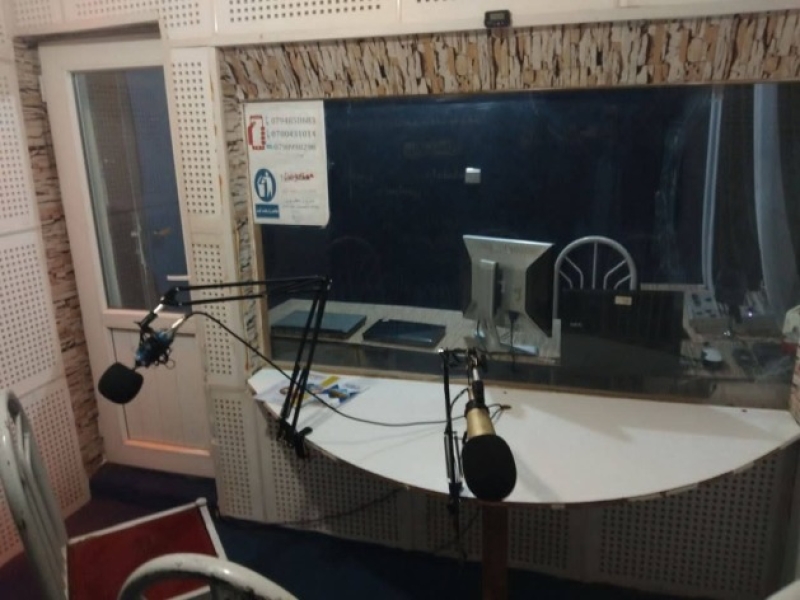- India Sees 9% Drop in Foreign Tourists as Bangladesh Visits Plunge |
- Dhaka Urges Restraint in Pakistan-Afghan War |
- Guterres Urges Action on Safe Migration Pact |
- OpenAI Raises $110B in Amazon-Led Funding |
- Puppet show enchants Children as Boi Mela comes alive on day 2 |
Radio Helps Afghan Teen Recover After School Ban

Women’s Voice Radio studio in Badakhshan, Afghanistan. Credit: Learning Together.
Mehrangiz, a sixteen-year-old girl from Badakhshan—a province in northeastern Afghanistan known for its beauty and gemstones—once dreamed of a bright future shaped by education. But the return of the Taliban to power in 2021 brought those dreams to a sudden halt.
"When I was in the 10th grade, I had dreams and aspirations. I studied every night by a kerosene lamp, even without electricity, hoping my future would be bright," she recalled.
Everything changed when the Taliban banned girls from attending school. One day, as she was writing in her garden, a classmate cried out that girls were no longer allowed to study.
"I was stunned into silence. I thought it would be temporary. But days passed, and nothing changed. I began to lose hope. My world turned dark—just one color: black."
As depression took hold, Mehrangiz experienced sleeplessness, loss of appetite, and an overwhelming sense of despair. At her lowest point, she burned all her textbooks.
"I told myself I would never study again. I buried myself in household chores to escape thinking about the future."
A Ray of Hope Through the Airwaves
Then came an unexpected turning point.
While shopping with her mother, they stopped for lunch at Kedbanu, a women-only restaurant in Badakhshan. There, a doctor was speaking on Sadee Banowan (Women’s Voice), one of the province’s most popular radio stations, about depression and mental health.
“The doctor’s voice was soothing and full of wisdom. I stopped eating just to listen more carefully,” said Mehrangiz. “Even my mother started listening when I signaled to her.”
The words of the doctor—and the thoughtful questions asked by the host—resonated deeply. After the broadcast, Mehrangiz called the station for more information and was invited to speak directly with the doctor.
Healing and Guidance
The following day, she visited the radio station, nervous but hopeful.
"I didn’t know if I could open up. But when I saw the doctor in person, the same one whose voice had lifted me the day before, I felt safe. I shared everything."
The doctor provided practical mental health advice: go outside, meet friends, wear bright colors, trust in God, and focus on moments of joy.
"She helped me shift my mindset. I've had four free psychotherapy sessions so far, and already about 30% of my mental health issues have improved. Life is smiling at me again. I now see everything in color."
The Role of Women’s Voice Radio
Women’s Voice Radio has been broadcasting since 2010 and is a vital source of support for women in Badakhshan. Its 24-hour programming includes content for both women and men, but its focus is on empowering women in a region where their rights are severely restricted.
After the Taliban returned to power, the station faced censorship and intimidation. It was even shut down for 23 days for airing a few seconds of music in an advertisement. But it resumed broadcasting—and expanded its programming in response to the crisis.
One of its signature initiatives is the "Maktab" (School) program, offering radio-based education to girls from grades 7 to 12 who can no longer attend school. Another popular show is "Psychotherapy," where a professional counselor provides guidance to women dealing with stress, anxiety, and depression.
There are also cultural and inspirational segments like "Art in the Embrace of Women," which highlights women-led initiatives in entrepreneurship, innovation, and the arts—giving listeners models of success to look up to.
Plans are now underway to open a dedicated psychotherapy center in Badakhshan to meet the growing mental health needs of women.
A New Chapter for Mehrangiz
The most unexpected outcome for Mehrangiz? A job offer from the radio station.
"I’ve been working at Women’s Voice Radio for three months now. The women here welcomed me with open arms, warm hugs, and big smiles. It feels like a family."
Through her work, she’s now part of the same support system that once saved her.
"To others, it’s just a radio station. But for me, it’s a university of life. I’ve learned how to face challenges and help others do the same."

